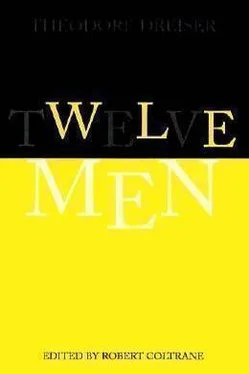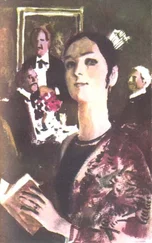Теодор Драйзер - Twelve Men
Здесь есть возможность читать онлайн «Теодор Драйзер - Twelve Men» весь текст электронной книги совершенно бесплатно (целиком полную версию без сокращений). В некоторых случаях можно слушать аудио, скачать через торрент в формате fb2 и присутствует краткое содержание. Год выпуска: 2014, Издательство: epubBooks Classics, Жанр: Биографии и Мемуары, на английском языке. Описание произведения, (предисловие) а так же отзывы посетителей доступны на портале библиотеки ЛибКат.
- Название:Twelve Men
- Автор:
- Издательство:epubBooks Classics
- Жанр:
- Год:2014
- ISBN:нет данных
- Рейтинг книги:4 / 5. Голосов: 1
-
Избранное:Добавить в избранное
- Отзывы:
-
Ваша оценка:
- 80
- 1
- 2
- 3
- 4
- 5
Twelve Men: краткое содержание, описание и аннотация
Предлагаем к чтению аннотацию, описание, краткое содержание или предисловие (зависит от того, что написал сам автор книги «Twelve Men»). Если вы не нашли необходимую информацию о книге — напишите в комментариях, мы постараемся отыскать её.
Twelve Men — читать онлайн бесплатно полную книгу (весь текст) целиком
Ниже представлен текст книги, разбитый по страницам. Система сохранения места последней прочитанной страницы, позволяет с удобством читать онлайн бесплатно книгу «Twelve Men», без необходимости каждый раз заново искать на чём Вы остановились. Поставьте закладку, и сможете в любой момент перейти на страницу, на которой закончили чтение.
Интервал:
Закладка:
He subsided and opened his little pint of wine.
Another day while I was there he began as follows:
"If there's one class of men that needs to be improved in this country, it's lawyers. I don't know why it is, but there's something in the very nature of the work of a lawyer which appears to make him cynical and to want to wear a know–it–all look. Most lawyers are little more than sharper crooks than the crooks they have to deal with. They're always trying to get in on some case or other where they have to outwit the law, save some one from getting what he justly deserves, and then they are supposed to be honest and high–minded! Think of it! To judge by some of the specimens I get up here," and then some lawyer in the place would turn a shrewd inquiring glance in his direction or steadfastly gaze at his plate or out the window, while the others stared at him, "you would think they were the salt of the earth or that they were following a really noble profession or that they were above or better than other men in their abilities. Well, if being conniving and tricky are fine traits, I suppose they are, but personally I can't see it. Generally speaking, they're physically the poorest fish I get here. They're slow and meditative and sallow, mostly because they get too little exercise, I presume. And they're never direct and enthusiastic in an argument. A lawyer always wants to stick in an 'if' or a 'but,' to get around you in some way. He's never willing to answer you quickly or directly. I've watched 'em now for nearly fifteen years, and they're all more or less alike. They think they're very individual and different, but they're not. Most of them don't know nearly as much about life as a good, all–around business or society man," this in the absence of any desire to discuss these two breeds for the time being. "For the life of me I could never see why a really attractive woman would ever want to marry a lawyer"—and so he would talk on, revealing one little unsatisfactory trait after another in connection with the tribe, sand–papering their raw places as it were, until you would about conclude, supposing you had never heard him talk concerning any other profession, that lawyers were the most ignoble, the pettiest, the most inefficient physically and mentally, of all the men he had ever encountered; and in his noble savage state there would not be one to disagree with him, for he had such an animal, tiger–like mien that you had the feeling that instead of an argument you would get a physical rip which would leave you bleeding for days.
The next day, or a day or two or four or six later—according to his mood—it would be doctors or merchants or society men or politicians he would discourse about—and, kind heaven, what a drubbing they would get! He seemed always to be meditating on the vulnerable points of his victims, anxious (and yet presumably not) to show them what poor, fallible, shabby, petty and all but drooling creatures they were. Thus in regard to merchants:
"The average man who has a little business of some kind, a factory or a wholesale or brokerage house or a hotel or a restaurant, usually has a distinctly middle–class mind." At this all the merchants and manufacturers were likely to give a very sharp ear. "As a rule, you'll find that they know just the one little line with which they're connected, and nothing more. One man knows all about cloaks and suits" (this may have been a slap at poor Itzky) "or he knows a little something about leather goods or shoes or lamps or furniture, and that's all he knows. If he's an American he'll buckle down to that little business and work night and day, sweat blood and make every one else connected with him sweat it, underpay his employees, swindle his friends, half–starve himself and his family, in order to get a few thousand dollars and seem as good as some one else who has a few thousand. And yet he doesn't want to be different from—he wants to be just like—the other fellow. If some one in his line has a house up on the Hudson or on Riverside Drive, when he gets his money he wants to go there and live. If the fellow in his line, or some other that he knows something about, belongs to a certain club, he has to belong to it even if the club doesn't want him or he wouldn't look well in it. He wants to have the same tailor, the same grocer, smoke the same brand of cigars and go to the same summer resort as the other fellow. They even want to look alike. God! And then when they're just like every one else, they think they're somebody. They haven't a single idea outside their line, and yet because they've made money they want to tell other people how to live and think. Imagine a rich butcher or cloak–maker, or any one else, presuming to tell me how to think or live!"
He stared about him as though he saw many exemplifications of his picture present. And it was always interesting to see how those whom his description really did fit look as though he could not possibly be referring to them.
Of all types or professions that came here, I think he disliked doctors most. The reason was of course that the work they did or were about to do in the world bordered on that which he was trying to accomplish, and the chances were that they sniffed at or at least critically examined what he was doing with an eye to finding its weak spots. In many cases no doubt he fancied that they were there to study and copy his methods and ideas, without having the decency later on to attribute their knowledge to him. It was short shrift for any one of them with ideas or "notions" unfriendly to him advanced in his presence. For a little while during my stay there was a smooth–faced, rather solid physically and decidedly self–opinionated mentally, doctor who ate at the same small table as I and who was never tired of airing his views, medical and otherwise. He confided to me rather loftily that there was, to be sure, something to Culhane's views and methods but that they were "over–emphasized here, over–emphasized." Still, one could over–emphasize the value of drugs too. As for himself he had decided to achieve a happy medium if possible, and for this reason (for one) he had come here to study Culhane.
As for Culhane, in spite of the young doctor's condescension and understanding, or perhaps better yet because of it, he thoroughly disliked, barely tolerated, him, and was never tired of commenting on little dancing medics with their "pill cases" and easily acquired book knowledge, boasting of their supposed learning "which somebody else had paid for," as he once said—their fathers, of course. And when they were sick, some of them at least, they had to come out here to him, or they came to steal his theory and start a shabby grafting sanitarium of their own. He knew them.
One noon we were at lunch. Occasionally before seating himself at his small central table he would walk or glance about and, having good eyes, would spy some little defect or delinquency somewhere and of course immediately act upon it. One of the rules of the repair shop was that you were to eat what was put before you, especially when it differed from what your table companion received. Thus a fat man at a table with a lean one might receive a small portion of lean meat, no potatoes and no bread or one little roll, whereas his lean acquaintance opposite would be receiving a large portion of fat meat, a baked or boiled potato, plenty of bread and butter, and possibly a side dish of some kind. Now it might well be, as indeed was often the case, that each would be dissatisfied with his apportionment and would attempt to change plates.
But this was the one thing that Culhane would not endure. So upon one occasion, passing near the table at which sat myself and the above–mentioned doctor, table–mates for the time being, he noticed that he was not eating his carrots, a dish which had been especially prepared for him, I imagine—for if one unconsciously ignored certain things the first day or two of his stay, those very things would be all but rammed down his throat during the remainder of his stay; a thing concerning which one guest and another occasionally cautioned newcomers. However this may have been in this particular case, he noticed the uneaten carrots and, pausing a moment, observed:
Читать дальшеИнтервал:
Закладка:
Похожие книги на «Twelve Men»
Представляем Вашему вниманию похожие книги на «Twelve Men» списком для выбора. Мы отобрали схожую по названию и смыслу литературу в надежде предоставить читателям больше вариантов отыскать новые, интересные, ещё непрочитанные произведения.
Обсуждение, отзывы о книге «Twelve Men» и просто собственные мнения читателей. Оставьте ваши комментарии, напишите, что Вы думаете о произведении, его смысле или главных героях. Укажите что конкретно понравилось, а что нет, и почему Вы так считаете.









